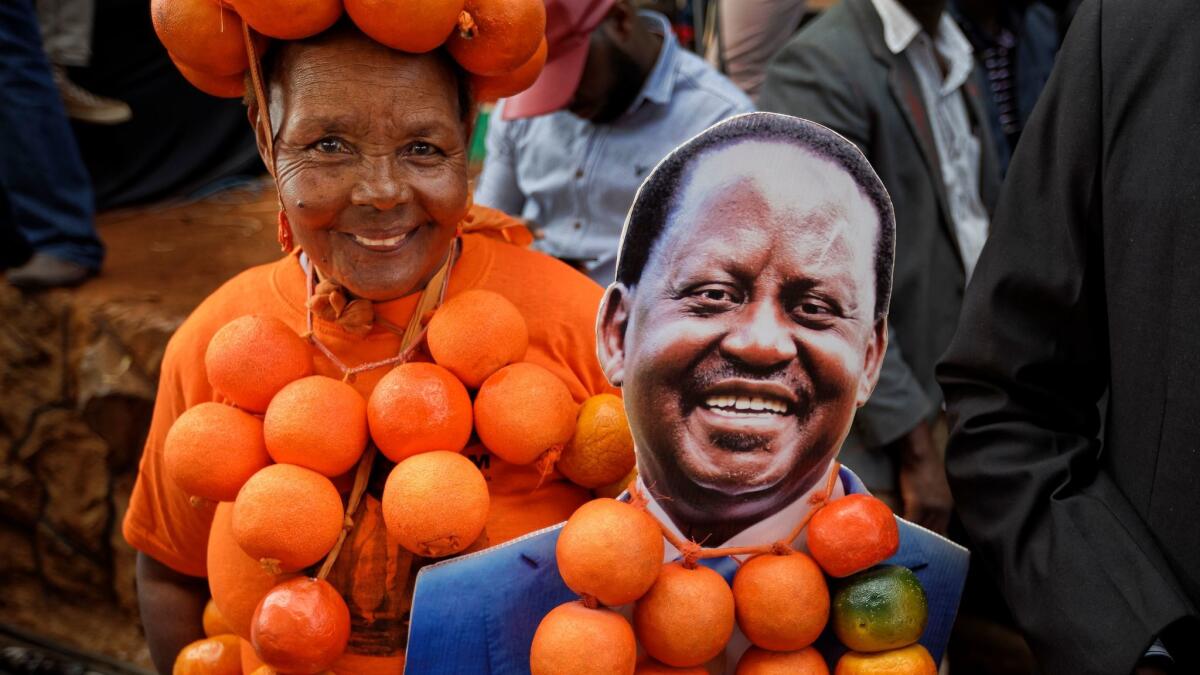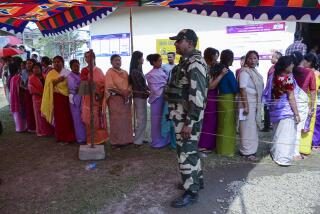In Kenya, memories of election horrors set an ominous tone for Tuesday’s vote
During election violence in Kenya in 2008, Jakiwa Inda watched men in military uniforms burn the slums at night.
Inda got back to his home in the Mathare slums, outside the capital Nairobi, and found his mother’s body so badly burned that he could only recognize one hand.
Enraged, he decided it was time to kill.
The slums had erupted with ethnic violence over the disputed December 2007 election that kept Mwai Kibaki, a member of the Kikuyu ethnic group, as president. Many Kikuyus, whose members are associated with the governing party, and Luos, whose members generally support the opposition, hacked each other to death with machetes.
Inda, who remains traumatized, sees ominous signs ahead of national elections Tuesday in Kenya, a country with a history of disputed, violent, ethnically charged elections.
The election sees two longtime rival political dynasties pitted against one another, with Raila Odinga, a 72-year-old Luo, struggling to dislodge President Uhuru Kenyatta, 55, a Kikuyu. Both are sons of towering Kenyan independence figures.
Last week’s torture and slaying of an election official, Chris Msando, who headed information technology in the electronic voting system, raised fears of an attempt to manipulate the result, although no killers or motive have been found.
On Saturday, the government deported four foreigners from Aristotle, a Washington political data mining firm employed by the opposition National Super Alliance to help conduct its own tally of votes from every polling station as a guard against election fraud.
Kenya’s tourism and growth have been tainted by decades of corruption and patronage, with contracts and benefits siphoned off to ethnic cronies. The benefits of the country’s 6% economic growth enriched a small elite but have not dented a 17% youth unemployment rate or reached the impoverished masses who claw out a living in urban slums or rural villages.
Two ethnic groups, the Kikuyus and Kalenjins, have benefited most from power since the country’s independence from Britain in the early 1960s, leaving the Luos and other groups aggrieved and marginalized.
“After independence, the politicians found this system of ethnic politics convenient. In Kenya, unfortunately, they continued to use ethnicity as the main tool on which to run elections. Politicians find it convenient because they know they can’t be challenged on policy,” said senior analyst Murithi Mutiga of the International Crisis Group. “It’s a crying shame, 54 years after independence, they still stick to that.”
At election time, politicians whip up negative sentiment and pay supporters to protest, or even riot.
In 2007, the presidential race between incumbent Kibaki and Odinga, in which independent observers reported ballot-box stuffing and other flaws, culminated with Kibaki being sworn into office in the dead of the night in a power grab that triggered weeks of ethnic violence. Estimates of the death toll vary from 1,000 to 1,500, but no one really knows how many were killed as slayings gripped slums and towns burned in the volatile Rift Valley.
According to a 2012 International Criminal Court indictment for crimes against humanity, Kenyatta played a key role in deploying the Mungiki criminal gang to kill, rape, attack and maim non-Kikuyu people. But after key witnesses in the case were killed, disappeared or withdrew testimony and the government blocked access to records, the prosecution withdrew the charges in 2014.
Inda, who in 2007 was a leader of a criminal gang called the GBs, or Good Boys, had taken advantage of the chaos to loot supermarkets. After his mother’s death, the gang turned on Kikuyus, dragging people from their houses.
“I became so emotional, wanting to revenge my mother, and started rallying youth to go and kill Kikuyus. I wanted to kill many, but we managed to kill three,” Inda said. “We just killed them in a mob. But I was doing it as if this person was the one who killed my mom.”
Inda’s younger brother was among six rioters shot dead in Mathare while trying to barricade a bridge. Inda’s fiancee was beheaded by a rival militia. He found her body, and her head was found in a different neighborhood four days later.
He collapsed and was taken to a clinic for a week. In that time, eight of his gang members were slain, shot by police or killed by ethnic rivals.
“What I learned in 2007 was that you might do something thinking you are doing the right thing, but sometimes you are doing the wrong thing,” Inda said. “You are killing Kikuyus thinking you are getting them back — but I didn’t get my mother back, I didn’t get my brother back, I didn’t get my fiancee back and I was left with a lot of trauma.”
He and other gang members agreed to stop their attacks after a respected elder told them that killing would not bring victory. Inda later received training from an international charity as a peace advocate and is part of a Catholic peace initiative in Mathare, the Parish Ecumenical Consultative Committee.
“We as peacemakers are just praying that the commission, the Independent Electoral and Boundaries Commission, will just conduct this election free and fair so that violence will not erupt. The community of Kenya doesn’t want violence. If the election goes otherwise, then violence can erupt very easily.”
Opposition trust has been frayed by the killing of Msando, the election official, the deportation of the Aristotle election data analysis team and a government ban on opposition plans to station unofficial monitors at all polling stations.

Nairobi bus stations are thronged with Kenyans trying to leave the capital, fearing new violence.
Alice Adhiambo, 40, of Mathare, sent her five children out of the city and plans to leave immediately after voting. With opinion polls suggesting a tight race, she said the atmosphere was already tense, with opposition supporters convinced the election would be stolen.
Last week, Adhiambo took part in a peace march in Mathare, “but people were responding and saying there will only be peace if the results will be announced free and fair.”
“A lot of people have left Kibera, going to the countryside for fear of violence,” said Mark Madegwa, an artist in Kibera, another major slum. “Today the streets are empty. There are no people and the matatus are nowhere to be seen,” he said, referring to commuter minibuses.
“In Kenya, when elections are close, we fear the chances of violence are higher because politicians don’t have a culture of political responsibility,” Mutiga, the analyst, said. “If it’s very close, it means the losing candidate may not concede as readily and violence may result.”
Another political analyst contacted for comments on the election declined, saying political tensions “can put my family at risk.”
Opposition candidate Odinga disputed the result in 2007 and unsuccessfully challenged the 2013 election, in which he lost to Kenyatta, in the Supreme Court. He has warned of possible mass protests if Tuesday’s election is considered rigged.
Another political analyst, Macharia Munene of the United States International University in Nairobi, predicted that Kenyatta would win the vote and that Odinga would not accept the result. Any violence would likely be contained in a few volatile pockets of the country, he said.
“If he doesn’t want to go to court if he’s not announced the winner, the implication is that he’s out for confrontation,” Munene said. “It’s the personality, it’s the disposition of Mr. Odinga.”
Civil society activists, including Gladwell Otieno of the African Centre for Open Governance, said the government ban on voters observing outside polling stations cast doubt on the openness of the voting process.
“Voters have a right to witness the polling station results as they are announced and to scrutinize the written record of those results, which are required to be posted at the polling stations,” Otieno told local media Friday.
The High Court upheld the ban Sunday, ordering that voters should stay at least 400 yards from polling booths after casting ballots.
In a sign of how entrenched ethnic voting is, Jane Nyambura, 40, a Kikuyu woman who runs a food kiosk in the Kibera slum, said she would vote for Kenyatta, supporting her usual political grouping, even though she distrusts all politicians.
“All politicians are the same. I think they are selfish, so I don’t trust whatever they say,” Nyambura said.
The hope for change, Mutiga said, lies in Kenyans ages 18 to 35, who comprise 51% of voters.
“One hopes that as young people become increasingly interconnected and better educated, maybe they will hanker for a different type of politics,” Mutiga said.
Twitter: @RobynDixon_LAT
More to Read
Start your day right
Sign up for Essential California for news, features and recommendations from the L.A. Times and beyond in your inbox six days a week.
You may occasionally receive promotional content from the Los Angeles Times.






